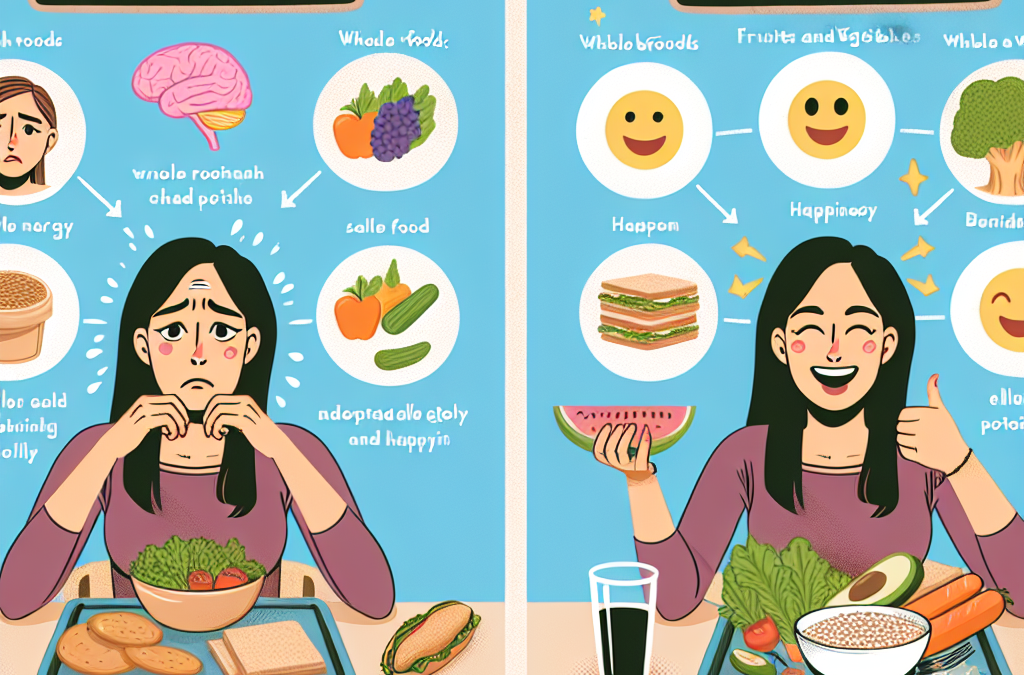Nourishing Your Body, Elevating Your Mood
The Connection Between Diet and Mood
Let me tell you, the things we eat are more than just fuel. I’ve learned that what I throw on my plate can toss my mood around like a beach ball in a windstorm. It’s fascinating how whole foods, which are packed with nutrients, can uplift my spirits compared to processed stuff full of sugar and additives. When I nourish my body with vibrant veggies and wholesome grains, I genuinely feel lighter and happier.
Studies back this up, proving that a diet rich in whole foods can reduce anxiety and even boost serotonin levels. Serotonin, for those who aren’t in the know, is that lovely little neurotransmitter that contributes to feelings of well-being and happiness. So, the next time you’re feeling a bit off, consider what’s in your fridge. A colorful salad might be just what the doctor ordered!
And hey, I’m not saying you need to go all kale-crazy. Sometimes, even simple changes—like swapping out that processed snack for some fresh fruit—can significantly affect your mood. It’s all about those small victories in your daily diet! Who knew a banana could be so powerful?
The Role of Nutrients in Mental Health
<h3Vitamins and Minerals Matter
Now, let’s dive into the nitty-gritty of vitamins and minerals. I’ve found out that certain nutrients play a huge role in mood regulation. For instance, B vitamins—like B6 and B12—are super crucial for brain health. They help manufacture neurotransmitters that are vital for our mood.
When I was feeling a bit sluggish, I discovered that incorporating foods like whole grains, eggs, and leafy greens into my meals made a world of a difference. It’s interesting how stabilizing your blood sugar with complex carbs can keep your energy and mood steadier. No more rollercoaster rides for me!
Additionally, minerals like magnesium and zinc have been shown to play roles in alleviating depressive symptoms. So, I’ve made it a habit to include nuts (walnuts are my jam), seeds, and legumes in my diet. Trust me, feeling a bit more grounded is worth it!
The Power of Fiber-Rich Foods
Fiber and Gut Health
Let’s talk about something I can’t get enough of: fiber! It’s often overlooked, but fiber-rich foods have a major impact on gut health, which is linked to mood. You see, a healthy gut means a happy brain. When I eat more fruits, veggies, and whole grains, I notice not only my digestion improves but also my overall sense of well-being.
Considering that a massive chunk of serotonin is produced in the gut, it only makes sense to keep that friendly flora thriving. I’ve jumped on the probiotic bandwagon and embraced fermented foods like yogurt and sauerkraut. They’ve given my gut—and mood—a serious boost!
So, if you haven’t hopped on the fiber train yet, I highly recommend it. Even adding a simple chia seed pudding to your breakfast routine can work wonders! Your body will thank you, and so will your mood.
Mindful Eating Practices
The Benefits of Being Present
I can’t stress enough the value of mindful eating. It’s not just about what I eat but how I eat. I was once a scarf-it-down kind of person, but learning to slow down and appreciate my meals transformed my relationship with food. Eating mindfully helps me enjoy each bite and also keeps me in tune with my body’s hunger signals.
Get an Amazing Discount on the Best Certified Organic Whole Food Supplement!
By practicing mindfulness during meals, I’ve noticed a significant decrease in stress levels. It’s like a mini-meditation session! I take the time to savor my food, which in turn enhances my overall eating experience. Plus, who doesn’t love the satisfaction of a well-enjoyed meal?
So, the next time you sit down to eat, try putting away your phone and turning off the TV. You’ll be surprised at how much more you’ll appreciate what you’re eating—and how much better you’ll feel afterward!
Community and Food Sharing
The Joy of Cooking Together
Let’s not forget about the social aspect of food! I’ve found that cooking and sharing meals with others can dramatically improve my mood. When I’m with friends or family, food becomes a vessel for connection. It’s incredible how laughter and good food go hand in hand.
Whether it’s a cozy dinner or a potluck gathering, sharing meals allows us to bond and create lasting memories. I’ve had some of my best days involving chopping veggies with friends and sharing stories around the table. It’s not just about the food but the people we share it with.
So, gather your friends, roll up those sleeves, and cook together! It’s a delightful way to boost mood, enjoy wholesome foods, and celebrate togetherness. It’s these moments that fill us up emotionally in ways that food alone can’t.
FAQs
1. Can whole foods really affect my mood?
Absolutely! Whole foods can nourish your body and contribute to mental well-being, helping to stabilize mood and reduce anxiety.
2. How do nutrients play a role in mood?
Certain vitamins and minerals, like B vitamins and magnesium, are vital for brain health and can help regulate mood.
3. What is the connection between gut health and mood?
A healthy gut helps to produce serotonin, which is essential for mood regulation. This is why fiber-rich foods and probiotics are important!
4. How can I practice mindful eating?
Try slowing down during meals, savoring each bite, and avoiding distractions like TV or smartphones. This enhances your eating experience and helps you listen to your body’s signals.
5. Why is sharing meals important?
Sharing meals fosters connection and community, which can significantly uplift your mood and create lasting memories with loved ones.





